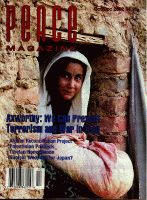
Peace Magazine Oct-Dec 2002, page 4. Some rights reserved.
Search for other articles by PMag staff here
Just now, the prospects for peace in the Middle East look bleak. President George W. Bush has announced a new doctrine, officially abandoning deterrence as the basis for America's security in the world, and declaring that pre-emptive strikes will be taken whenever the United States regards them as necessary, although he also promises to consult multilaterally. Accordingly, the United Nations, as well as Canada's own foreign minister, have taken new notice of their responsibility to ensure that Iraq is not acquiring weapons of mass destruction.
There are alternative means. In the short term, the former weapons inspector Scott Ritter believes that the best approach is to acknowledge that Iraq has substantially disarmed, (95percent so) and proceed to the next phase of the UN mandate, which would involve ongoing monitoring; evidently Saddam Hussein would accept inspections at that level, but not at the highly intrusive previous level. According to Ritter, as well as the Iraqis, the United States used the inspections to gather unauthorized intelligence for its own purposes before removing the inspectors just prior to the "Desert Fox" operation. According to Ritter, the "maintenance level" of inspections would suffice.
But such a solution would ultimately fall short, in that Saddam Hussein is truly a dictator, and the only way to develop a country is to encourage democracy. Not only Iraq, but alsomost other Islamic societies, need assistance in gaining freedom. They must manage such a regime change themselves, but resources can be provided to help, as was done in Serbia to bring down Milosevic, and as the Tibetans and the Burmese are now doing. They are mobilizing nonviolent resistance, following the astute advice of Gene Sharp. Opposition movements have mixed opinions about accepting foreign financial support, as Ken Simons pointed out in our last issue, but the most common view at least welcomes support for training in nonviolent resistance.
Democracy is needed everywhere -- especially in developing countries , but even our own democratic institutions also can stand improvement. In this issue, Dr. Lloyd Axworthy reminds us that true security depends on protecting the safety of human beings. His doctrine of "human security" is the only way to achieve that, plus economic development, and the flourishing of humankind. Let us not be distracted by panicky militarists.

Peace Magazine Oct-Dec 2002, page 4. Some rights reserved.
Search for other articles by PMag staff here